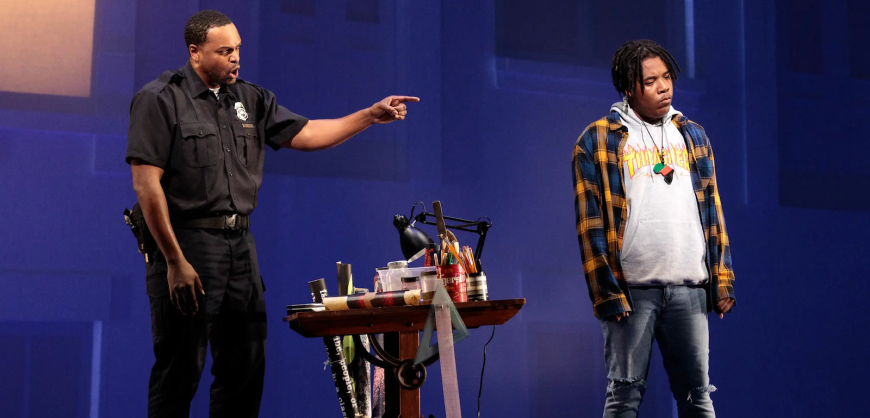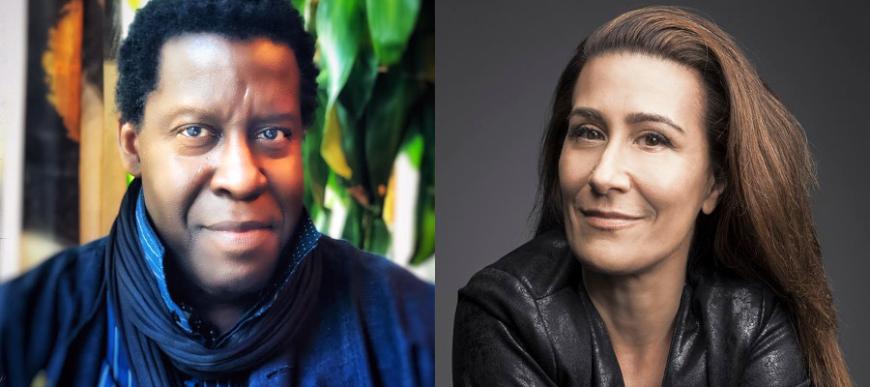
Almost three years after the premiere of Blue at Glimmerglass, the 2020 winner of the Music Critics Association of North America’s (MCANA) Annual Award for Best New Opera has made it to disc. Well recorded for Pentatone at co-commissioner Washington National Opera Company’s June 2021 production, the recording highlights the successful marriage of Jeanine Tesori’s moving score with director/librettist Tazewell Thompson’s brilliant take on the ongoing antagonisms between America’s Black population and officers in blue. It also underscores the informed vision of Francesca Zambello, a leading force at Glimmerglass, WNO, and San Francisco Opera who contacted both composer and future librettist about her desire to commission an opera about race in America.
After seeing Seattle Opera’s production of Blue this past spring, I questioned if Tesori’s score equaled the greatness of Thompson’s achievement. The libretto is so strong, compact, of-the-moment, and true to racial realities that Tesori’s music seemed almost like window dressing. Having revisited the opera on recording in 24/192 high-resolution download (it’s also available as a SACD), I now believe part of my problem was a seat in the middle of McCaw Hall’s acoustically compromised balcony. Tesori’s score is moving in the best way.
The under-three-minute instrumental prologue begins ominously, with a dark racket that alerts us to the tragedy ahead. But first come joy and humor, as the Mother’s three girlfriends learn of her pregnancy, her marriage to a policeman, and the sex of her future child. Once the girlfriends learn that she expects a boy, discourse and music undergo a radical change as fears about the uncertain future of Black boys in America surface. “Thou shalt bring forth no Black boys into this world!” intone the girlfriends in this opening scene. The women eventually join together in an emotional prayer for the baby’s future.
As the opera proceeds, Thompson’s critique of male culture and the tendency to close off the heart is as spot-on as his contrast between the traditional desires of men and women. Thompson takes no relationship or platitude for granted. Rather, he frequently questions the absolutes of traditional relationships, searching instead for the spiritual bond that motivates what is lasting and true. Especially notable is how, during the Father’s extended Act I confrontation with his Son, he keeps singing “My son, my son.” When this paternalistic language is repeated by the Reverend whom the Father turns to after his son has been killed by a fellow officer of the law, the Father follows his Son’s example by rejecting the language as empty.

The recording boasts the same five principal artists as the first productions: bass Kenneth Kellogg (the Father), mezzo-soprano Briana Hunter (the Mother), tenor Aaron Crouch (the Son), baritone Gordon Hawkins (the Reverend), and soprano Ariana Wehr (Girlfriend 1/Congregant 1/Nurse). They are, for the most part, wonderful singers. Kellogg’s voice occasionally betrays a beat, but his voice is so resonant, full, and expressive that a small flaw is easy to overlook. As the archetypical Father who speaks with authority, he’s nigh perfect.
At age 63, Hawkins has reached the point in his long career where steadiness often cedes to wobble. The Reverend’s Act II exchange with the Father is one of the most moving in the opera, but it’s precisely when Hawkins must open his voice wide to affirm God’s infinite goodness that pressure exposes the finite nature of the operatic voice. His sound, thankfully, retains its sonorous beauty.
Blue embodies the essence of great opera: It unites a deeply moving story with music that stirs the passions and touches the heart. There’s no filler, no moment where composer or librettist lingers too long or self-indulges. It’s a stunning achievement that deserves a permanent place in the repertory.








